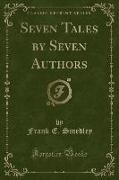Read more
Excerpt from Seven Tales by Seven Authors
A lady, herself an authoress, was some years ago introduced as a contributor to Snamn's magazine, at that time conducted by the Editor of the present volume. Owing to cir cumstances, into which it is unnecessary to enter, the precarious income of a magazine writer was the chief resource on which this lady had to rely, for the support of herself and her young family, although there was good reason to hope, that if the effects of an imme~ diate pressure could be averted, a brighter prospect lay before her.
About the Publisher
Forgotten Books publishes hundreds of thousands of rare and classic books. Find more at www.forgottenbooks.com
This book is a reproduction of an important historical work. Forgotten Books uses state-of-the-art technology to digitally reconstruct the work, preserving the original format whilst repairing imperfections present in the aged copy. In rare cases, an imperfection in the original, such as a blemish or missing page, may be replicated in our edition. We do, however, repair the vast majority of imperfections successfully; any imperfections that remain are intentionally left to preserve the state of such historical works.
About the author
Francis Edward Smedley (1818 - 1864) was an English novelist. His name appears in print usually as Frank E. Smedley. He was born with deformed feet, a disability that impaired his mobility and prevented him from attending regular school. Instead he was privately educated by his uncle. His cousin, the poet Menella Bute Smedley, later kept house for him and acted as his secretary. Smedley died in London in 1864. Smedley contributed his first book, Scenes from the Life of a Private Pupil, anonymously to Sharpe's London Magazine in 1846-1848. His first essay proved so successful that it was expanded into Frank Fairlegh, and published in book-form in 1850. His next book Lewis Arundel or The Railroad of Life was originally contributed to the same magazine, which he for some time edited and was published in book-form in 1852. Of his other writings the best-known is Harry Coverdale's Courtship (1855). These stories are racily told.

